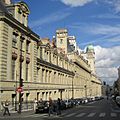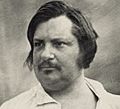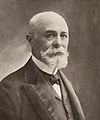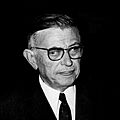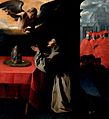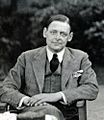University of Paris facts for kids
|
Université de Paris
|
|
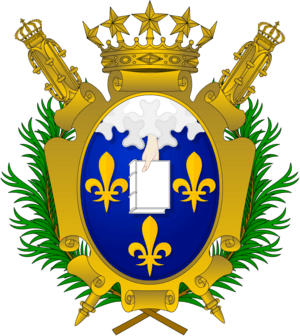 |
|
| Latin: Universitas magistrorum et scholarium Parisiensis | |
| Motto | Hic et ubique terrarum (Latin) |
|---|---|
|
Motto in English
|
Here and anywhere on Earth |
| Type | Corporative from c. 1150 to 1793 and public from 1896 to 1970 |
| Active | Circa 1150 – 1793, 1896–1970 |
| Location |
,
France
|
| Campus | Urban |
The University of Paris (called Université de Paris in French) was a very famous university located in Paris, France. It was one of the very first universities ever started in Europe, beginning in the mid-1100s. Many people also called it the Sorbonne or la Sorbonne. This name came from a college called Collège de Sorbonne, which was started around 1257 by a person named Robert de Sorbon.
In 1971, the University of Paris was divided into thirteen separate universities.
Contents
A Look at Its History
How the University Began
The University of Paris started around the year 1150. It grew from different church schools in Paris. At first, it was like a group or "guild" of teachers and students. They worked together to learn and teach. This was a new way for people to get an education.
The Sorbonne's Special Role
The name "Sorbonne" became very well known. This was because of the Collège de Sorbonne. It was a special college founded in 1257. It helped students who were studying theology, which is the study of religion. Over time, the name Sorbonne was often used for the whole University of Paris.
Changes Over Time
The university was closed for a while in 1793. This happened during the French Revolution. It reopened later in 1896 as a public university. This meant it was run by the government. It continued to be a major center for learning.
The University Splits Up
In 1971, the large University of Paris was split. It became thirteen different, independent universities. These new universities still carry on the tradition of learning in Paris. They are spread across the city.
Famous People Who Studied Here
Many important people studied or taught at the University of Paris. These include thinkers, writers, and scientists. They made big contributions to the world.
- John Calvin
- Thomas Aquinas
- Denis Diderot
- Voltaire
- Honoré de Balzac
- Michel Foucault
- Antoine-Henri Becquerel
- Marie Skłodowska Curie
- René Cassin
- Henri Bergson
- Jean-Paul Sartre
- Jean Tirole
- Bonaventure
- François Guizot
- Jean-Jacques Ampère
- Victor Cousin
- Henri Poincaré
- Jacques Derrida
- Gabriel Lippmann
- Jean Perrin
- Alfred Kastler
- Irène Joliot-Curie
- Jules Bordet
- T. S. Eliot
Images for kids
See also
 In Spanish: Universidad de París para niños
In Spanish: Universidad de París para niños







